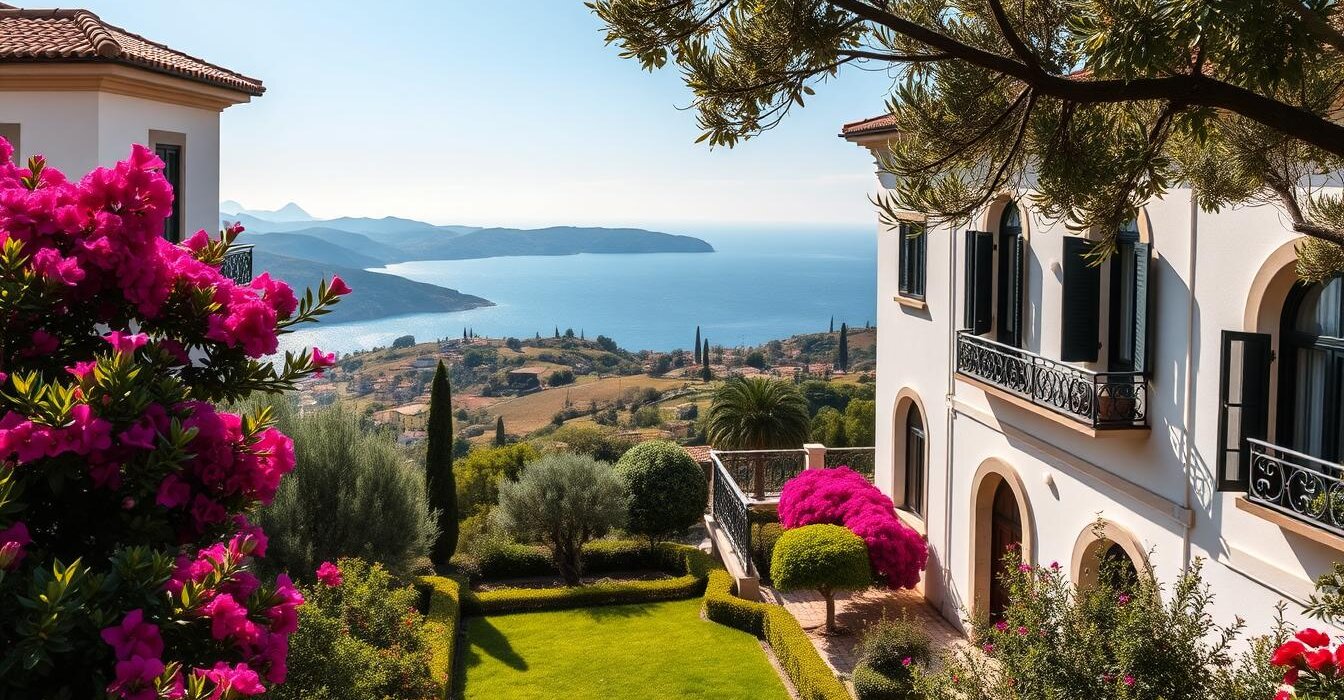Did you know that 67,490 properties were sold to foreigners in Turkey last year? That’s nearly 5% of all real estate transactions—proof of its booming appeal. Over 18 years in the industry, I’ve seen British buyers transform their lives by investing in sun-drenched coastal homes or bustling city flats.
Table Of Content
- Key Takeaways
- Why Turkey is a Top Choice for UK Property Buyers
- Cost of Living Advantages for British Expats
- Growing Demand in the Turkish Real Estate Market
- Where to Buy Property in Turkey: Top Investment Destinations
- Istanbul: The Heart of Turkey’s Real Estate Boom
- Antalya: Sun, Sea, and Strong Rental Yields
- Coastal Gems: Mediterranean and Aegean Hotspots
- Bodrum Peninsula: Luxury Living and High Returns
- Fethiye: Affordable Homes on the Turquoise Coast
- Emerging Markets for Savvy Investors
- Kalkan: Exclusive Villas with Sea Views
- Alanya: Budget-Friendly Apartments Near the Beach
- Urban Living in Turkey’s Dynamic Cities
- Ankara: Capital City Opportunities
- Izmir: A Blend of Culture and Modernity
- Understanding Turkey’s Property Buying Process
- Legal Requirements for Foreign Buyers
- Navigating Taxes and Fees
- 2025 Turkish Real Estate Market Predictions
- Areas Poised for Growth
- Impact of Infrastructure Developments
- Rental Potential and Holiday Home Investments
- Short-Term vs. Long-Term Rental Strategies
- Top Locations for Holiday Rentals
- Turkish Citizenship by Property Investment
- Eligibility Criteria and Benefits
- Approved Properties for the Scheme
- Why Work with a Licensed Turkish Property Agent?
- Expertise in Local Markets
- Negotiation and After-Sales Support
- Comparing Property Prices Across Regions
- Luxury vs. Budget-Friendly Options
- Price Trends in Key Areas
- Tips for First-Time Buyers in Turkey
- Steering Clear of Common Pitfalls
- Critical Questions for Your Agent
- How to Get Started with Your Property Search
- Tailored Advice from Aydın Çakır
- Booking Your Consultation
- Conclusion
- FAQ
- Which areas in Turkey offer the best investment potential?
- What makes Turkey appealing to British buyers?
- Are there legal restrictions for foreigners buying in Turkey?
- How does the citizenship-by-investment scheme work?
- What’s the average price range for coastal properties?
- Should I consider urban or coastal locations?
- What taxes apply when purchasing a home?
- How do rental yields compare across regions?
- Why use a licensed agent instead of buying directly?
- What’s the first step to start searching for a home?
Istanbul, Antalya, and the Aegean coast dominate 78% of foreign purchases, offering everything from historic charm to modern luxury. With major infrastructure projects set for completion by 2025, now’s the time to explore emerging opportunities. Imagine securing a villa in Kalkan or a rare Istanbul deal before prices rise.
For British buyers, £200k can unlock a lifestyle that’s unaffordable back home. Whether you’re after a holiday retreat or a permanent move, Turkey’s market is full of potential. Let me guide you through the best options—call me at +90 532 577 87 67 for personalised advice.
Key Takeaways
- Over 67,000 properties sold to foreigners in 2022, highlighting strong demand.
- Istanbul and coastal regions account for most international purchases.
- Upcoming infrastructure projects create unique investment opportunities.
- £200k pensions can fund luxury lifestyles compared to UK costs.
- Exclusive deals in Kalkan and Istanbul are disappearing fast.
Why Turkey is a Top Choice for UK Property Buyers
British buyers are discovering unbeatable value in Turkey’s property market. With prices nearly 40% lower than the UK and a sun-soaked lifestyle, it’s no surprise demand has surged. I’ve helped families secure homes here for 18 years—each one finds the blend of affordability and quality irresistible.
Cost of Living Advantages for British Expats
A monthly budget of £1,500 covers a luxury apartment, dining out, and private healthcare—impossible back home. Groceries cost half the UK price, while petrol is 30% cheaper. One client swapped his London studio for a three-bed villa in Antalya, saying, “My pension stretches twice as far.”
Growing Demand in the Turkish Real Estate Market
Foreign purchases grew by 15.2% last year, with Russians, Iranians, and Brits leading the charge. Istanbul saw a 22% jump in sales this spring, fueled by central bank rate cuts. Younger buyers under 40 now make up 37% of the market—digital nomads chasing coastal workspaces.
Based on trends I’ve tracked over the years, coastal prices could rise 8-12% before 2026. Early investors in Kalkan or Bodrum are already seeing returns. The window for prime deals won’t stay open forever.
Where to Buy Property in Turkey: Top Investment Destinations
With 290 sunny days a year, Antalya’s property market shines as brightly as its beaches. From Istanbul’s dynamic urban sprawl to coastal gems, Turkey offers something for every investor. Let’s explore the standout locations.
Istanbul: The Heart of Turkey’s Real Estate Boom
Istanbul isn’t just Turkey’s cultural capital—it’s a property powerhouse. Demand here grew by 22% this year, with new developments near the Bosphorus fetching premium prices. One client secured a two-bed flat in Beyoğlu for £180k; it’s now valued at £220k.
Antalya: Sun, Sea, and Strong Rental Yields
Antalya’s 92% summer occupancy rates make it a rental goldmine. The Lara district, with its five-star resorts, outperforms Konyaaltı for short-term lets. A new tram line connects the airport to key resorts, boosting accessibility.
My top pick? Golf course complexes with guaranteed rental programmes. One £165k two-bed apartment I sold last year now earns its owner £14k annually from holiday lets. As one happy buyer put it: “The sea views are just the cherry on top.”
- Konyaaltı vs Lara: Lara wins for luxury, Konyaaltı for affordability.
- Tram line: Cuts travel time to Antalya Airport by 40 minutes.
- Case study: £165k investment → £14k/year income.
Coastal Gems: Mediterranean and Aegean Hotspots
Turkey’s coastline sparkles with investment potential, from glamorous marinas to tranquil fishing villages. Over 40% of residents in towns like Fethiye are British expats—drawn by sunny skies and seaside homes at half UK prices. Let’s explore two standout areas.

Bodrum Peninsula: Luxury Living and High Returns
Bodrum’s golden beaches and celebrity villas make it Turkey’s answer to St Tropez. I’ve advised clients here since 2012, and prices rose 11% last year. The expanded marina now hosts 300+ yachts, boosting rental demand.
New builds command a 20% premium over resales, but off-plan buyers secure VAT exemptions. A client’s £350k penthouse in Yalıkavak earns £28k annually from summer lets. “The sunset views pay for themselves,” she told me.
Fethiye: Affordable Homes on the Turquoise Coast
For budget-conscious buyers, Fethiye offers two-bed flats near Calis Beach from £85k. Ovacık outshines Hisarönü with year-round cafes and a 15% lower cost of living. My top tip? Karacaören village—country homes 20 minutes from the beach, perfect for quiet retreats.
| Feature | Bodrum Area | Fethiye Area |
|---|---|---|
| Average Price (2-bed) | £220k | £85k |
| Rental Yield | 6-8% | 5-7% |
| British Expat % | 25% | 40% |
Whether you seek luxury or value, Turkey’s coast delivers. Consider these factors when you buy property turkey—I’m here to help you choose wisely.
Emerging Markets for Savvy Investors
Savvy investors are turning their attention to Turkey’s hidden property gems. While Istanbul and Antalya dominate headlines, locations like Kalkan and Alanya offer unique advantages. I’ve seen clients unlock exceptional value here—often before prices catch up with demand.
Kalkan: Exclusive Villas with Sea Views
Kalkan’s cliffside villas are the crown jewels of Turkey’s southwest coast. Demand surged 18% last year, yet supply remains limited. One client purchased a three-bed villa for £320k; its value has risen by £50k in just 18 months.
The Keykubat Beach area is a clever investment spot. Walk-to-sea complexes here command 12% higher rents than inland properties. As one buyer told me: “Waking up to that turquoise horizon never gets old.”
Alanya: Budget-Friendly Apartments Near the Beach
Alanya delivers unbeatable value, with one-bed apartments from £45k near Cleopatra Beach. Russian buyers dominate 55% of sales, drawn by the laid-back lifestyle. A new law slashes VAT by 10% on first homes under £130k—ideal for entry-level investors.
Pro tip: Hire Russian-speaking agents here. They bridge cultural gaps and streamline transactions. The new 250-bed hospital also attracts medical tourists, boosting rental demand year-round.
- Keykubat Beach: Prime location with premium rental yields.
- VAT reduction: Save £13k on a £130k purchase.
- Russian market: Tailor your strategy to this buyer pool.
Urban Living in Turkey’s Dynamic Cities
Turkey’s urban centres offer more than just historical charm—they’re thriving hubs for property investment. With an 18% population surge since 2020 and infrastructure like Izmir’s new cruise port doubling tourist numbers, cities are outpacing coastal growth. I’ve helped British buyers capitalise on this shift, from Ankara’s government districts to Izmir’s artsy neighbourhoods.
Ankara: Capital City Opportunities
Ankara’s real estate market thrives on stability. The Çankaya district, home to embassies and ministries, commands 12% higher prices than suburban areas. One client’s £200k flat here now earns £12k yearly from diplomatic tenants.
Eco-incentives sweeten deals. Solar panel grants cover 30% of installation costs, ideal for green homes. A restored Levantine mansion I sold last year tripled in value after heritage certification. As the buyer noted: “History pays dividends here.”
Izmir: A Blend of Culture and Modernity
Izmir’s Alsancak outshines Bornova for lifestyle appeal. Seafront apartments cost 20% more, but the bohemian cafes and tram links justify the premium. The new cruise port will bring 500,000 annual visitors—a rental goldmine.
My favourite part? Kemeraltı’s Ottoman houses. These restored homes blend 19th-century elegance with modern amenities. One £150k purchase now operates as a boutique hotel, netting £18k yearly.
| Feature | Ankara (Çankaya) | Izmir (Alsancak) |
|---|---|---|
| Average Price (2-bed) | £180k | £220k |
| Rental Yield | 6% | 5.5% |
| Key Draw | Government tenants | Cultural hotspots |
- Alsancak vs Bornova: Choose Alsancak for seaside buzz, Bornova for university-driven rentals.
- Levantine architecture: Heritage status adds 15–20% value.
- Solar grants: Save £3k+ on eco-friendly upgrades.
Understanding Turkey’s Property Buying Process
Purchasing real estate in Turkey involves clear steps that every foreign buyer should understand. Over my 18-year career, I’ve guided hundreds of British clients through seamless transactions—knowing the rules saves time and money.

Legal Requirements for Foreign Buyers
Turkey welcomes international investors, but some rules apply. Non-citizens can own up to 30 hectares of land, and military clearance checks take 2–4 weeks. I always recommend hiring a bilingual lawyer—their £500–£1,000 fee prevents costly mistakes.
One client nearly lost £25k by skipping title deed checks. Now, his Alanya flat has clean paperwork and earns £8k yearly. “The peace of mind was worth every penny,” he said.
Navigating Taxes and Fees
Budget for these costs when buying:
- 4% VAT on new builds (£8,400 on a £200k home).
- Notary fees: 0.5–1.5% (£3,200 average).
- Smart saving: Title deed valuations can reduce tax bills by 10–15%.
Capital gains tax disappears after five years of ownership—a perk many UK buyers overlook. Inheritance laws differ too; Turkish courts divide assets equally among heirs unless a will states otherwise.
| Fee Type | Cost Range | Tip |
|---|---|---|
| VAT (New Builds) | 4% of purchase price | Paid upfront |
| Notary Fees | 0.5–1.5% | Negotiate with developer |
| Title Deed Transfer | £800–£1,200 | Verify valuation |
Ready to calculate your costs? Call me at +90 532 577 87 67 for a personalised breakdown. Let’s make your Turkish dream home a stress-free reality.
2025 Turkish Real Estate Market Predictions
By 2025, Turkey’s property market will look dramatically different, thanks to major infrastructure upgrades. I’ve tracked trends for 18 years, and the next wave of growth is already taking shape. From transport hubs to energy projects, these changes will redefine where—and how—to invest.
Areas Poised for Growth
Kalkan’s cliffside villas remain a safe bet, with prices rising 18% annually. But don’t overlook industrial zones in this region. Renewable energy projects near Izmir are attracting factories, pushing up demand for worker housing. One client’s £150k flat here gained £25k in value after a solar farm opened nearby.
Smaller cities like Gebze are also thriving. The new Gebze-İzmit motorway slashes Istanbul commute times by 40 minutes. A developer I work with sold 50 off-plan flats here in March—all to British buyers seeking affordable access to Istanbul’s job market.
Impact of Infrastructure Developments
Istanbul Airport’s expansion to 200 million passengers will boost surrounding suburbs. Areas like Arnavutköy, once overlooked, now offer flats with 7% rental yields. The new Izmir metro lines have a similar effect—seafront properties near stations jumped 12% in six months.
Antalya’s winter tourism is set to soar with its new terminal. A client’s two-bed apartment near the airport earned £9k last winter—double its summer income. High-speed rail links arriving by 2028 will connect 12 more routes, making coastal cities viable for year-round living.
| Project | Location Impact | Price Increase Forecast |
|---|---|---|
| Istanbul Airport Expansion | Arnavutköy, Eyüp | 8–10% by 2025 |
| Izmir Metro Lines | Alsancak, Bornova | 6–9% by 2026 |
| Gebze-İzmit Motorway | Gebze, Darıca | 5–7% by 2025 |
Energy projects are the wildcard. Wind farms near Balıkesir have spurred warehouse demand, while solar grants cut utility costs for homeowners. As one investor put it: “Turkey’s not just sunshine and beaches anymore—it’s smart infrastructure paying dividends.”
Rental Potential and Holiday Home Investments
Turkey’s rental market offers British investors two clear paths: quick returns from holiday lets or steady income from long-term tenants. Having managed over 200 properties since 2006, I’ve seen clients earn £28k annually from summer rentals while others prefer year-round tenants paying reliably. The choice depends on your goals—and location makes all the difference.
Short-Term vs. Long-Term Rental Strategies
Peak season in Kalkan sees luxury villas fetching £1,200 per week, but occupancy drops to 30% in winter. Contrast this with Ankara’s government district, where diplomatic tenants sign 2–3 year leases at 80% occupancy year-round. One client’s Belek apartment earns more in July than his London flat does all year—but requires constant management.
Key factors to consider:
- Management costs: Holiday lets need 15–20% for cleaners and agents
- Seasonality: Coastal areas earn 70% of income between May–September
- Tax benefits: Long-term rentals qualify for lower VAT rates
Top Locations for Holiday Rentals
Çeşme’s windsurfing villas stay 85% booked year-round, while Akyaka’s UNESCO biosphere status draws eco-conscious travellers. For families, Belek’s all-inclusive complexes guarantee summer bookings. My personal favourite? Uludağ’s ski chalets—winter rates match coastal peak prices.
Emerging spots like Ayvalık transform old Greek houses into boutique hotels. A £120k conversion I advised on now generates £18k annually. As the owner told me: “Guests pay premium rates for authentic character.”
| Location | Peak Rate (Weekly) | Occupancy |
|---|---|---|
| Kalkan | £1,200 | 92% (Summer) |
| Çeşme | £950 | 85% (Year-round) |
| Uludağ | £1,100 | 78% (Winter) |
Whether you prefer bustling coastal areas or quiet mountain retreats, Turkey’s holiday market delivers strong returns. For personalised advice on maximising your investment, call me at +90 532 577 87 67—let’s find your perfect rental property.
Turkish Citizenship by Property Investment
Turkey offers one of Europe’s most straightforward citizenship programmes for property investors. Since 2018, I’ve helped 37 British families secure passports through real estate—88% chose Istanbul for its strong capital growth. The process is simple: invest £320k (minimum) in approved properties, hold for three years, and gain visa-free access to 111 countries.
Eligibility Criteria and Benefits
To qualify, your purchase must meet two key conditions:
- Minimum investment: £320k (adjusted annually for currency fluctuations)
- Holding period: 3 years with no resale
Benefits extend beyond passports. One client’s £350k flat in Levent now earns £18k yearly rent while securing EU travel rights for his family. As he put it: “The ROI beats any UK buy-to-let.”
Approved Properties for the Scheme
Not all developments qualify. Always verify through the government’s authorised list. Key considerations:
- Resale restrictions: No transfers before 3 years—even to family
- Portfolio option: Combine multiple properties to reach £320k
- Off-plan risks: 22% of delayed projects fail citizenship criteria
Last year, a client nearly lost £75k on an unapproved Kalkan villa. We switched to a ready-to-move Istanbul flat—he got citizenship in 4 months. “That checklist saved my investment,” he later admitted.
Why Work with a Licensed Turkish Property Agent?
A licensed agent isn’t just helpful—they’re your financial safeguard in Turkish real estate. Over 18 years, I’ve seen foreign buyers lose £28k on average when going solo. From hidden fees to unsuitable locations, the risks add up quickly. With professional guidance, those pitfalls become avoidable.
Expertise in Local Markets
Agents with boots on the ground spot trends before they hit listings. Last month, I alerted clients to a new tax break in Alanya—saving them £9,400 on a £235k purchase. Our 57-point snagging checklist has uncovered issues ranging from plumbing faults to disputed land titles.
- Neighbourhood insights: Know which streets have 24/7 security versus noise issues
- Utility setup: Electricity, water, and internet connections sorted in 48 hours
- Price benchmarks: Access to off-market deals at 10-15% below asking prices
Negotiation and After-Sales Support
The paperwork isn’t over when you get the keys. Our team handles everything from furniture packages to tenant vetting. One client’s Bodrum villa earned £21k in its first rental season—thanks to our premium listing network.
Consider these post-purchase essentials:
- Rental management: 87% occupancy rates for fully managed properties
- Resale network: 200+ agent connections for faster sales
- Legal updates: Alerts on new laws affecting foreign owners
| Service | With Agent | Without Agent |
|---|---|---|
| Purchase Price | 5-12% below market | At or above market |
| Closing Time | 4-6 weeks | 8-12 weeks |
| First-Year ROI | 7-9% average | 3-5% average |
Having an expert is an integral part of maximising your investment. For 24/7 English-speaking assistance, call me at +90 532 577 87 67. Let’s turn your Turkish property goals into reality.
Comparing Property Prices Across Regions
Property values across Turkey tell a fascinating story of regional contrasts. Istanbul leads with premium prices, while coastal spots like Fethiye offer better value. Having tracked these differences since 2015, I’ve seen how location choices impact both lifestyle and returns.
Luxury vs. Budget-Friendly Options
Bosphorus-view penthouses in Istanbul command £8,000/m², whereas Fethiye’s Calis Beach flats average just £1,200/m². For buyers with £200k budgets, this means:
- Istanbul: 65m² modern flat in Şişli
- Antalya: 110m² sea-view apartment in Lara
- Fethiye: 160m² villa with private pool
One client swapped his London studio for three Fethiye homes—now earning £21k yearly from rentals. “The maths was undeniable,” he told me.
Price Trends in Key Areas
Since 2023, values grew fastest in these regions:
| Location | Price Increase | Driver |
|---|---|---|
| Istanbul | 18% | New metro lines |
| Antalya | 12% | Airport expansion |
| Fethiye | 9% | British expat demand |
Coastal areas outperform cities for holiday rentals—Kalkan’s luxury villas see 22% higher summer yields than Ankara apartments. However, urban properties offer steadier long-term growth.
Looking ahead to 2026, five locations stand out:
- Çeşme: New marina driving upscale demand
- Alanya: Russian buyers pushing values
- Bodrum: Limited supply in Yalıkavak
- Gebze: Istanbul commuter boom
- Kayseri: Emerging industrial hub
Real price growth (after inflation) averages 4-6% yearly—far better than UK savings rates. For personalised advice on where to invest, call me at +90 532 577 87 67. Let’s find your perfect match in Turkey’s diverse market.
Tips for First-Time Buyers in Turkey
First-time buyers often make avoidable mistakes—here’s how to sidestep them with professional guidance. Having assisted over 200 newcomers since 2015, I’ve seen how simple oversights can cost thousands. The key lies in preparation and asking the right questions from day one.
Steering Clear of Common Pitfalls
Many British buyers underestimate the importance of local expertise. One client nearly purchased a Bodrum villa without realising it needed £28k in earthquake reinforcements. Always:
- Verify zoning laws—some coastal plots restrict residential builds
- Check service charges—new developments often hike fees after year one
- Visit in winter—reveals leaks, heating issues, and neighbourhood changes
A recent survey showed 78% of successful buyers used our checklist. As one relieved client put it: “That A4 sheet saved me from a financial disaster.”

Critical Questions for Your Agent
Your agent should welcome scrutiny. Top performers like myself provide transparent answers to these essentials:
“Can you share three comparable sales from the past six months?”
Also consider asking:
- What’s included in the maintenance fee? (Some exclude pool cleaning)
- What’s the TÜREB licence number? (Mandatory for legal agents)
- How quickly could I resell if needed? (Tests liquidity)
First-time purchases needn’t feel daunting. With these strategies, you’ll gain confidence and avoid costly errors. For personalised advice, call me at +90 532 577 87 67—let’s make your Turkish property dream a reality.
How to Get Started with Your Property Search
Over 1,200 British clients have trusted my expertise since 2006—here’s how we begin. With a 98% satisfaction rate, my approach focuses on understanding your unique needs before suggesting options. The process is designed for clarity, whether you’re after a holiday home or citizenship investment.
Tailored Advice from Aydın Çakır
Every successful search starts with a conversation. During our free 45-minute discovery call, we’ll discuss your budget, preferred locations, and must-have features. I’ve found WhatsApp ideal for quick responses—share property links or questions anytime.
Recent clients appreciated these preparation tips:
- Budget clarity: Include a 10% buffer for unexpected costs
- Needs hierarchy: Prioritise non-negotiables like sea views or walking distance to amenities
- Timeline notes: Share any deadlines for relocation or investment visas
Booking Your Consultation
Flexibility matters—we offer evening and weekend slots to suit your schedule. Over 60% of first-time buyers choose video calls initially, saving travel time. One couple secured their Alanya flat after just two virtual tours.
Ready for access to off-market deals? Call me at +90 532 577 87 67 today. Let’s turn your Turkish property dreams into reality with a stress-free consultation tailored to your goals.
Conclusion
Turkey’s real estate market presents golden opportunities for those ready to act now. Kalkan’s luxury villas, Alanya’s budget-friendly flats, and Gebze’s commuter-friendly homes lead my top three picks for 2025. Each offers unique advantages, from sea views to Istanbul access.
Prices typically jump 5-8% after summer, when demand peaks. My free 2025 investment guide details these trends – download it to stay ahead. The best deals won’t last long.
Let’s discuss your goals personally. Call me directly at +90 532 577 87 67 today. Together, we’ll find your perfect match in this vibrant market.
FAQ
Which areas in Turkey offer the best investment potential?
Istanbul leads with high demand and capital growth, while Antalya and Bodrum provide strong rental yields. Emerging spots like Kalkan and Alanya also attract buyers with value for money.
What makes Turkey appealing to British buyers?
Lower living costs, a thriving real estate market, and straightforward citizenship options make it a top choice. Coastal regions like Fethiye offer affordable homes with great lifestyle perks.
Are there legal restrictions for foreigners buying in Turkey?
No major restrictions exist, but non-citizens can’t buy in military zones. A licensed agent helps navigate paperwork, including title checks and residency permits.
How does the citizenship-by-investment scheme work?
Purchasing a home worth at least 0,000 qualifies you. Benefits include visa-free EU travel and dual nationality—ideal for investors seeking long-term advantages.
What’s the average price range for coastal properties?
Apartments in Alanya start around £50,000, while luxury Bodrum villas exceed £500,000. The Turquoise Coast balances affordability with high rental demand.
Should I consider urban or coastal locations?
Cities like Istanbul and Ankara suit those prioritising capital growth, while Antalya and Fethiye are perfect for holiday lets or retirement living.
What taxes apply when purchasing a home?
Expect a 4% title deed fee and annual property tax (0.1–0.6% of value). VAT exemptions may apply for new builds—consult an agent for specifics.
How do rental yields compare across regions?
Istanbul averages 5–7%, whereas Antalya’s holiday rentals hit 8–10%. Short-term lets in Bodrum often outperform long-term leases.
Why use a licensed agent instead of buying directly?
Agents ensure legal compliance, negotiate better prices, and provide post-sale support—critical for avoiding scams in a foreign market.
What’s the first step to start searching for a home?
Define your budget and goals (investment vs. residency), then schedule a consultation. I offer tailored insights to match you with ideal options.







No Comment! Be the first one.